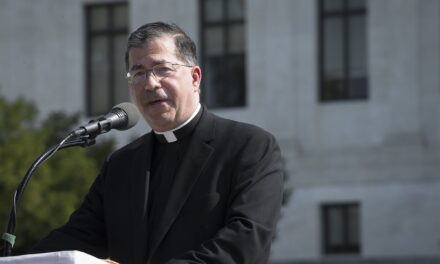Yesterday, I stated that the document, “Know the Positions of the Presidential Candidates,” was a product of the USCCB. Today I received a message, friendly, from someone I know at the USCCB who told me the document did not originate with the USCCB, and that the “State Catholic conferences act completely independently of the USCCB.” “The only resource put out by the USCCB is Faithful Citizenship,” she added. The USCCB official was under the impression the presidential comparison had only been published by the Virginia Catholic Conference. But, as I told her, when I also found it published by the Florida Catholic Conference and the Pennsylvania Catholic Conference, I assumed it originated at “headquarters,” i.e., the USCCB. I apologize for the mistaken assumption. Beyond those three states, and some of the dioceses within the states (Orlando & Arlington), I have not located any other postings of “Know the Positions of the Presidential Candidates.” Thus, I have revised my headline of this column to “Some Bishops Deceive Catholic Voters on Clinton and Trump Abortion Views.” There’s no need to change the rest of the analysis of how “Know the Positions of the Presidential Candidates” is deliberately deceiving. Why do I say “deliberately”? That’s easy to answer: The person or persons who put this comparison together undoubtedly knew that Clinton’s position on abortion was far more extreme than the comparison indicates. I didn’t even mention the softball version of Clinton on freedom of religion — the document doesn’t even mention her now infamous statement that “religious beliefs and structural biases have to be changed” to allow more abortions. The State Catholic Conferences may operate independently of the USCCB but some of them, at least, do not operate independently of each other. “Know the Positions” starts with the issue of abortion, with the description of Hillary Clinton opening with her “safe and legal” mantra before moving, quickly, to her Hyde Amendment opposition. This is ALL the Catholic Conferences have to say about Clinton’s position on abortion.
‘“I believe we need to protect access to safe and legal abortion, not just in principle but in practice,’ Clinton said at a rally in January. “Clinton supports the repeal of the Hyde Amendment and the Democratic Party Platform states, ‘We will continue to oppose—and seek to overturn—federal and state laws and policies that impede a woman’s access to abortion, including by repealing the Hyde Amendment.’ The Hyde Amendment restricts the use of federal funds to pay for abortions.” Seriously? The Conference officials appear too unconcerned to mention this comment on “Meet the Press” (4/6/16):
“The unborn person doesn’t have constitutional rights.”
To downplay Clinton’s extreme support for abortion-on-demand in this way, it has to be said, is both misleading and deceptive. And there’s no mention of her vocal support for Planned Parenthood either.
Meanwhile, the description of Donald Trump’s position on abortion does not begin on a positive note the way Clinton’s does. The Conferences’ description of Trump begins with a reminder of his former ‘pro-choice’ position.
“While Trump previously described himself as ‘pro-choice; in August 2015 Trump said he has ;very much evolved’ on the issue of abortion and ‘I am pro-life.’ He said he supports exceptions in the case of rape, incest and when the life of the mother is at risk.
The 11 other positions described by the Conferences are the death penalty, euthanasia, educational choice, environmental responsibility, freedom of religion (not “religious liberty”), health care access for the uninsured, immigration, international security, marriage (close to the bottom), poverty, and refugees displaced by terrorism. Whatever you think of the issues chosen, the remainder of the “positions” descriptions are less egregious, though not without the taint of prejudice against Trump. Clinton comes out looking bad on euthanasia, educational choice, marriage, and freedom of religion. Trump, of course, looks bad on the death penalty, the environment, immigration, poverty, and refugees. There is no attempt by the Conferences to underscore the priority of the life issues, abortion and euthanasia, in relation to the rest. At least they are found at the top of the candidate’s position descriptions and not at the bottom. But anyone just keeping score would have no reason to consider Hillary Clinton unfit for office in spite of her abortion extremism.















This is no surprise. The bishops’ conference, and individual bishops, have been going as far as they dare in their support for Hillary, usually by bashing Trump. Read this appalling column by Archbishop Chaput, and see if you can find any hint of the crimes of Trump that justify Chaput’s claimed inability to distinguish his record from Hillary’s abortion fanaticism:
http://catholicphilly.com/2016/08/think-tank/archbishop-chaput-column/some-personal-thoughts-on-the-months-ahead/
Shame on the bishops who are helping to muddy the waters in order to get the most pro-abortion candidates, (see Clinton & Kaine), elected. As a pro-life sidewalk counselor for many years, I am very disappointed with the USCCB’s lack of real leadership, (other than lip-service & photo-ops), especially for pro-life issues. Their wordy, obscure, smoke-screen voter guides over the years have probably helped to get the most pro-abortion politicians elected leading to the deaths of countless unborn babies. Also, their lack of real outcry over the heretical Catholic In Name Only politicians, (i.e. Biden, Pelosi, etc.), has caused scandal and is an embarrassment, to say the very least. They will one day be held responsible for their lack of solid shepherding. God sees all. Life Site News has an article, “BREAKING: Leaked e-mails show George Soros paid $650K to influence bishops during Pope’s US visit”. It’s a very sad state of affairs when a rich opponent of the Catholic Church feels confident that he can buy/influence the Pope and the bishops to undermine the Catholic Church. If they do not stand up for life, they are weak and look weak. Pray for the bishops to be strong, solid shepherds. Thanks.